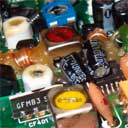 The other night my wife and I went out to see Narnia. It was a great experience, but I’ll save the review for the bloggers that focus on movies. However I did notice something during the show that I felt was worth a mention.
The other night my wife and I went out to see Narnia. It was a great experience, but I’ll save the review for the bloggers that focus on movies. However I did notice something during the show that I felt was worth a mention.
You see, we don’t go to movies that often. Instead, we tend to watch DVDs or TV shows in the comfort of our own home. Now that Kelli works for the movie theater we can get in for free, so we celebrated one day by having her not go home at the end of her shift.
And we sat there.
When I watch a movie at home I will usually have my laptop open in front of me. I’ll chat with friends, search for lesson ideas, edit photos, and so on. Kelli spends just as much time online as I do, sometimes even more.
If you try that in a theater, they’ll ask you to leave.
When I’m on the road or working around the house I’ll listen to a variety of podcasts, since their audio only format allows me to multi task.
You can’t listen to mp3 players in the theater either.
Perhaps it’s a symptom of ADD, but during that relatively short time at the movies I got a taste of what our digital native students might feel when they’re removed from their technology. While I enjoyed the movie and the time I got to spend with my wife I felt totally unproductive during the slow parts of the film.
At that point I thought, “I should be blogging this!”
So I did.
Now what does this tell me about education?
The same thing that my 2nd grade Ojibwa basket lesson told me last week.
I had this great lesson where students would cut out a construction paper template and then lace it up to make a basket. It was really slick, but they had a lot of problems with it and we ran out of time.
I came back at the end of the day (with the classroom teacher’s blessing) and continued the lesson, but this time I only had a few kids work on baskets at a time while the rest of them did some other classwork.
And the kids finished both projects so fast it was amazing.
Multiple simultaneous activities can (if done correctly) help to maintain interest and decrease the time those projects would need to be completed seperately.
I need to go plan some art lessons that can be used simultaneously.




